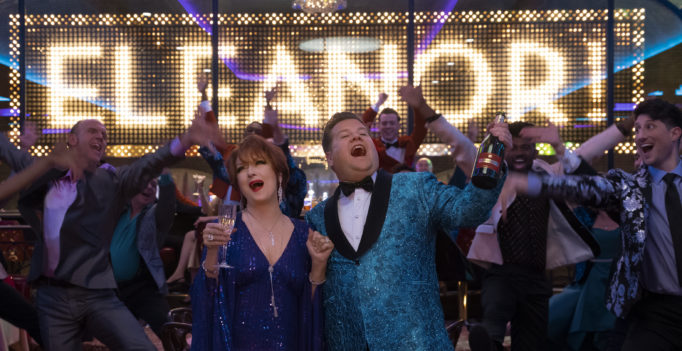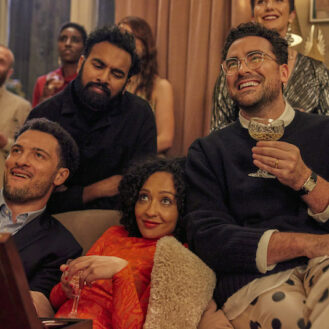The Prom is a musical about a group of famous performers who use their clout and flashy personalities to make a stand against the discrimination of the LGBT community. However, despite how inspiring this story is supposed to be, the movie is also supposed to be satirizing celebrities who are more concerned about their image than the cause they’re fighting for. It’s a piece of irony that’s lost on The Prom, a film that wants to inspire young LGBT viewers but can’t get out of its own way when flaunting its all-star cast and expensive-looking musical numbers. But despite this oversight, The Prom is still a pretty good time. Picture Footloose if it took a spin in a cotton candy machine.
After performing together in the big screen adaptation of Into the Woods, The Prom reunites Meryl Streep and James Corden. This time, they receive more screen time together as Dee Dee Allen and Barry Glickman, two stage stars trying to rebound their careers after stinking up Broadway in a show that closes shortly after opening. In their funk, they spitball with fellow out-of-work actors Trent Oliver (Andrew Rannells) and Angie Dickinson (Nicole Kidman) and come to an agreement that the best way to find their own resurgence is to throw themselves behind a trending issue. Almost as if it was written in the stars, they discover Emma (Jo Ellen Pellman). Emma, a gay high school student in Indiana, is being ostracized for who she is and she’s excluded from her senior prom by the PTA, headlined by her girlfriend’s mom (Kerry Washington). Desperate for justice (and attention), the actors team up with the school’s principal (Keegan-Michael Key) to help Emma find a voice through the hate.
Adapted from the Broadway show of the same name, The Prom is directed with plenty of hutzpah by director Ryan Murphy. While he’s directed films before (Running with Scissors and Eat Prey Love), The Prom is obviously more in line with his efforts on Fox’s former hit show Glee. That same infectious energy is alive in The Prom, although Glee showed more restraint. Here, Murphy turns up the extravagance to truly flex this bigger platform, but the larger scope of the production is occasionally too much for the filmmaker to handle. The choreography is, sometimes, edited too heavily with sections of the ensemble being cut out altogether. But I really liked how incessant Ryan Murphy was to make his movie stay true to its glamorous theatre roots, even using in-camera colourful lighting techniques to boost musical numbers.
As mentioned, the film has a hard time laughing at itself. Aside from Andrew Rannells, who seems to be reliving his days performing The Book of Mormon to personally connect with the satirical subtext within his character in The Prom, and Nicole Kidman, who mostly stays on the sidelines, no one in the film wants to appear goofy past their wardrobe. This ends up preventing people like Streep and Corden from truly throwing themselves into their roles. But those resisting to “camp it up” earn forgiveness through their dedication to their assigned musical numbers and really driving home the film’s message of inclusion. Believe me: nobody is slumming it in The Prom.
**********
Do You Tweet? Follow These Tweeple:
Addison Wylie: @AddisonWylie





Be the first to comment